"I learned how to plant seeds, about production techniques and how to harvest, and my yields grew." "I learned how to make crop production schedules and how to sell at the market, and by trying some new things I increased my income." These are the comments of farmers in Nampula Province, Mozambique.
In 2009, JICA agreed to carry out the ProSAVANA Project in this region along with the government of Mozambique. The project supports the creation of frameworks to make possible sustainable agriculture in ways that match local needs. In the ten years since, the project has greatly improved the lives of farmers, with crop productivity increasing and farming incomes growing
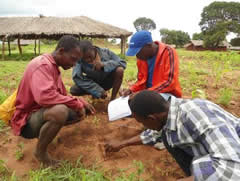
Farmers learn ways of planting seeds from one another.
A high potential for increased agricultural production
Mozambique is in the southern part of the continent of Africa and it has about twice as much land as Japan. About 80 percent of the workforce works in agriculture. Most of them are smallholders who only use traditional techniques and aren't very productive. However, in the northern region that is the target of the ProSAVANA Project, there is a lot of fertile land and abundant rainfall, so it is thought to have the potential for greatly improved agricultural productivity.
The ProSAVANA was started in 2009, targeting Nampula Province, Niassa Province and Zambezia Province in northern Mozambique, a country where promoting agriculture is a national issue. Its purpose is to improve agricultural productivity and yields by introducing agricultural techniques that are appropriate to the actual conditions in each area where it is implemented. The project is being carried out as triangular cooperation by Japan, Brazil and Mozambique.
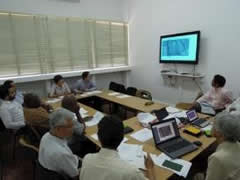
Stakeholders from Japan, Brazil and Mozambique check on the progress of the ProSAVANA Project.
Developing crop cultivation techniques appropriate to the region with farmers
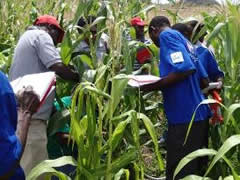
Extension agents are trained in cultivation methods in a corn field at an agricultural experiment station.
Under the ProSAVANA Project, JICA first developed appropriate cultivation and soil improvement techniques for increasing productivity of the staple crops of corn and soybeans, based out of two agricultural experiment stations in the Nacala Corridor region in northern Mozambique. In the case of corn, it developed a technology that increased yields from 2.4 t/ha to 4.5 t/ha.
After repeated discussions with researchers at the agricultural experiment stations, Japanese experts tested optimal cultivation methods with farmers using a trial and error approach.
"Farmers who grew corn in a trial were highly motivated, happy and reliable, and said, 'It's growing very well. I want to learn various other cultivation techniques'," said one Japanese expert involved in the project locally.
Working together as husband and wife: Farmers have a change of mindset
Since 2013, JICA has been providing cooperation to groups of farmers in target areas, giving each instruction in produce processing techniques and helping them set up agricultural cooperative associations, in addition to spreading agricultural techniques.
The farmers themselves acquired the ability to earn money from farming by not only talking to one another about what crops to grow, but also by going to market themselves and investigating when different crops are sold. The annual incomes of members of the farmers' group that raised poultry grew by about 20 percent on average. The enterprise got on track when the farmers were given equipment and training in breeding techniques, and the farmers said that their incomes increased, they built additions to their homes and they were able to supplement their children's educational expenses.
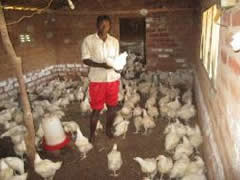
A farmer takes care of chickens just before they are to be shipped.
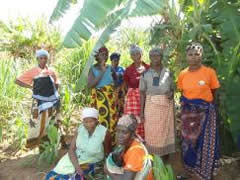
Members of a women farmers' group
And when the project gave gender training in which participants learned how to manage family finances and plan crop production as a couple, traditional attitudes toward gender — such as that men should control the purse strings — began to change. The women made comments including "I used to gather firewood while carrying a child on my back, but now my husband shares in the chores" and "We talk as a couple about how to use our savings."
10 years after the start of the ProSAVANA Project, not only have crop productivity and production output increased, farmers have firmly adopted a mindset of proactive agricultural work. "I didn't think we'd be able to do this much," said a farmer involved in the project.
As farmers show great enthusiasm — with one asking for assistance with marketing to improve crop sales — JICA will continue supporting farmers through the ProSAVANA Project in ways that meet those needs.
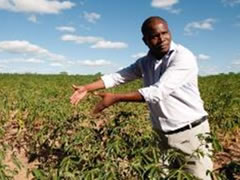
A cassava field





scroll